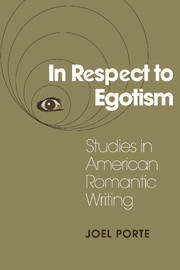Book contents
- Frontmatter
- Contents
- Preface
- Acknowledgments
- In Respect to Egotism
- Introduction: Writing, Reading, Romanticism
- 1 “Where … Is This Singular Career to Terminate?”: Bewildered Pilgrims in Early American Fiction
- 2 “Where There Is No Vision, the People Perish.…”: Prophets and Pariahs in the Forest of the New World
- 3 Poe: Romantic Center, Critical Margin
- 4 Emerson: Experiments in Self-Creation
- 5 Hawthorne: “The Obscurest Man of Letters in America”
- 6 Thoreau's Self-Perpetuating Artifacts
- 7 Melville: Romantic Cock-and-Bull; or, The Great Art of Telling the Truth
- 8 Douglass and Stowe: Scriptures of the Redeemed Self
- 9 Whitman: “Take Me as I Am or Not at All.…”
- Interchapter: Walt and Emily
- 10 Dickinson's “Celestial Vail”: Snowbound in Self-Consciousness
- Notes
- Index
- CAMBRIDGE STUDIES IN AMERICAN LITERATURE AND CULTURE
6 - Thoreau's Self-Perpetuating Artifacts
Published online by Cambridge University Press: 24 March 2010
- Frontmatter
- Contents
- Preface
- Acknowledgments
- In Respect to Egotism
- Introduction: Writing, Reading, Romanticism
- 1 “Where … Is This Singular Career to Terminate?”: Bewildered Pilgrims in Early American Fiction
- 2 “Where There Is No Vision, the People Perish.…”: Prophets and Pariahs in the Forest of the New World
- 3 Poe: Romantic Center, Critical Margin
- 4 Emerson: Experiments in Self-Creation
- 5 Hawthorne: “The Obscurest Man of Letters in America”
- 6 Thoreau's Self-Perpetuating Artifacts
- 7 Melville: Romantic Cock-and-Bull; or, The Great Art of Telling the Truth
- 8 Douglass and Stowe: Scriptures of the Redeemed Self
- 9 Whitman: “Take Me as I Am or Not at All.…”
- Interchapter: Walt and Emily
- 10 Dickinson's “Celestial Vail”: Snowbound in Self-Consciousness
- Notes
- Index
- CAMBRIDGE STUDIES IN AMERICAN LITERATURE AND CULTURE
Summary
Henry Thoreau had a horror of ending things, perhaps because it felt like death. His great theme, of course, was renewal, the Romantic myth of infinite self-possibility and self-extension. In the second chapter of Walden, for example, he makes much of the ritual of morning ablutions because it represented his principal “religious” exercise in the Thoreauvian cult of regeneration. He cites with pleasure words supposed to have been “engraven on the bathing tub of King Tching-thang” as if to appropriate them for his own motto: “Renew thyself completely each day; do it again, and again, and forever again.” Doing things again was to become Thoreau's only stock in trade: another walk in Concord or further excursions elsewhere, another bath in Walden Pond, a tireless reiteration in his journal of the year's natural phenomena. Thoreau believed that his pilgrimages, no matter how trivial or repetitive, presented fresh opportunities for renewal and thus constituted religious exercises; the traveler, he tells us in the “Thursday” section of A Week, must expect to be “born again on the road.” His favorite journeys, accordingly, were westerly ones - not for the usual American reasons (a chance to start over in the Western Reserve or in the gold-laced foothills of the Sierras), but for the sake of a geographico-spiritual paradox that engaged him as much as it would Whitman after him. Noting that “there is an orientalism in the most restless pioneer,” Thoreau concludes that “the farthest west is but the farthest east.”
- Type
- Chapter
- Information
- In Respect to EgotismStudies in American Romantic Writing, pp. 164 - 188Publisher: Cambridge University PressPrint publication year: 1991



